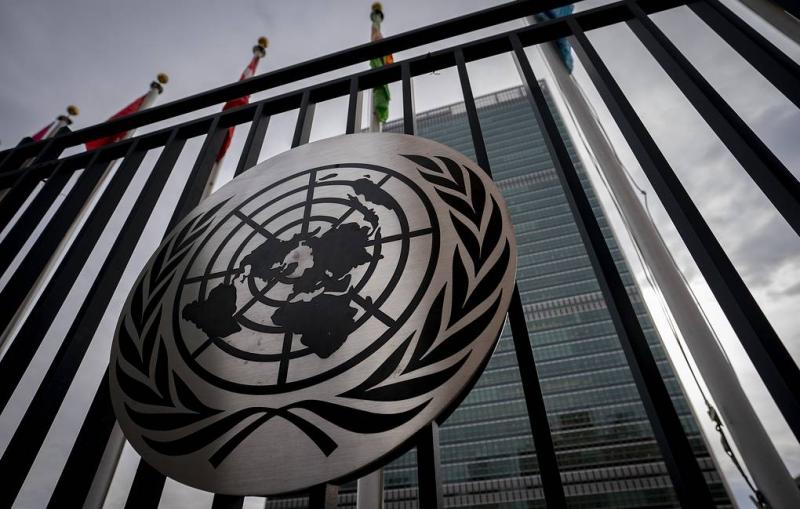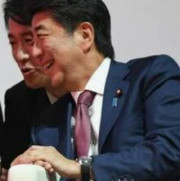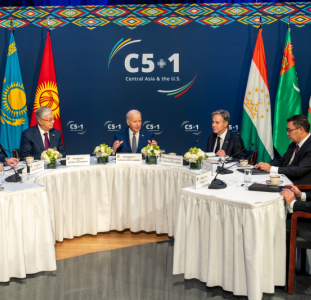
© AP Photo/John Minchillo/TASS
Top stories from the Russian press on Tuesday, September 13th, prepared by TASS
Izvestia: When can the Zaporozhye nuclear power plant resume operations?
Specialists need several days to relaunch the Zaporozhye nuclear power plant, head of the regional military-civilian administration Yevgeny Balitsky told Izvestia, commenting on the nuclear facility’s shutdown. However, he stressed that, in order to make this decision, guarantees are needed that it is safe for the power plant to function and there would be no more bombings. That said, nuclear physicists caution that a strike by a shell of a caliber surpassing 150 mm risks catastrophic consequences and radioactive contamination, comparable with that of Chernobyl and Fukushima, even if the nuclear station is not functioning.
"Since the shelling continued, naturally, there were risks of radiation emissions. Of course, a nuclear station is built to withstand some excesses but not rockets constantly raining down on it," Stanislav Mitrakhovich, a senior expert at the National Energy Security Fund told the newspaper.
Nuclear physicist Andrey Ozharovsky, an expert with the Russian Social and Ecological Union, told Izvestia that the threat of a new nuclear disaster was indeed great. "With a hit of a ballistic or a cruise missile, the reactor building will be 100% destroyed. In the event of damage, the first contour containing radioactive substances would lose containment resulting in contamination," he noted, stressing a high likelihood of a Chernobyl-like catastrophe as a result.
According to the physicist, in a worst-case scenario, the destruction of only one of the power plant’s six nuclear power blocks would contaminate a zone of several hundred kilometers. That said, it is difficult to predict where the radionuclides would go, since it depends on weather conditions. The expert said that a radioactive cloud may reach Russia’s Kursk and Voronezh Regions in concentrations requiring the evacuation of residents. Additionally, the emitted isotopes may fly across all of Ukraine reaching Belarus or Moldova. The physicist did not rule out risks that the radioactive cloud may reach Slovakia, the Czech Republic and even Austria.
Nezavisimaya Gazeta: Russia risks being shut out of UN high-level meeting
On Tuesday, the 77th session of the General Assembly kicks off at UN headquarters in New York. It will culminate in the High-Level Week from September 20 through 26. According to Russian President Vladimir Putin’s instructions, Moscow’s delegation should be led by Foreign Minister Sergey Lavrov. However, the issue of his US visa still remains open.
The Russian Foreign Ministry stated that the US has been violating international obligations on issuing visas to delegates from Moscow for a while. When it was decided to place the UN headquarters in New York, Washington concluded an agreement with the UN Secretariat. While by now, according to Alexey Drobinin, head of the Russian Foreign Ministry’s Foreign Policy Planning Department, quite a few examples have accumulated of the US not fulfilling its obligations under this agreement. Moscow has already raised the issue of moving the UN headquarters to a neutral state.
"These issues are brought up and I can confirm that this is not an idle subject - moving the UN ‘capital’. This concerns not only Russia but other countries as well that for one reason or another became unwelcome by the US. And now the number of these countries is growing and will continue to grow," Drobinin said in an interview with the International Affairs magazine.
Whatever the case, experts are alarmed. "We are collectively paralyzed," says Administrator of the UN Development Program Achim Steiner. "In a world defined by uncertainty, we need a renewed sense of global solidarity to tackle our interconnected, common challenges," he explained.
Rossiyskaya Gazeta: Where will the EU’s proposed price ‘cap’ steer Russian oil?
In early December, an embargo on tanker imports of Russian oil to EU countries and a mechanism on restricting prices on its sea deliveries coordinated by G7 countries will come into effect simultaneously. If everything is relatively clear with the EU ban, Europe will be able to receive Russian oil only via pipelines, then with the price "cap" it is unclear which other oil importers will join the Group of Seven.
In addition to the G7 (the UK, Germany, Italy, Canada, France, Japan and the US) and the EU in general, the largest global oil importers are China, India, South Korea and some other countries in the Asia-Pacific Region (APAC). And while the volumes of oil consumption in Europe remain approximately at the same level, even decreasing somewhat, demand for oil is growing in the majority of APAC states. China and India alone are ahead of the entire Europe in terms of the volumes of oil imports. And all APAC countries, with the exclusion of Japan and Australia, account for more than 48% of global oil trade. So both Russian oil exports and the success of anti-Russian sanctions will depend precisely on APAC.
According to Associate Professor at the Russian Government’s Financial University Valery Andrianov, APAC countries have nothing to agree upon with the West in the sphere of oil deliveries. The G7 states are mainly net importers of energy products, competing with countries of the East for access to energy resources. The West is losing this fight because by slapping sanctions and restrictions on Russia it cuts off the supplies of Russian hydrocarbons and redirects them to Asian markets. The majority of APAC countries did not join any anti-Russian sanctions and, moreover, they have no reason to support the illogical introduction of a price cap on oil and gas, the expert noted.
That said, Portfolio Manager at Alfa Capital Dmitry Skryabin thinks that Russian oil is economically attractive for Asian importers, considering the discount on Brent. However, it is impossible to dismiss certain political risks. The US has repeatedly stated that it was considering applying secondary sanctions against third countries who would buy Russian oil at a price higher than the one set by the G7.
Kommersant: Balloting in regional, local elections shows strong support for Putin
On Monday, the experts of the Civil Society Development Foundation publicly explained the reasons for high results of United Russia and state candidates during the recent Russian election. According to them, the factor of Russia’s special military operation in Ukraine basically turned the election into a vote of confidence for the president while the parliamentary opposition virtually sat this election out. However, experts caution that the government should not relax. Next year, in their opinion, the election will be impacted by the consequences of the sanctions and the socio-economic situation in general as well as by "angry patriots" - those who think that Russia is not implementing its decisions in the special operation consistently and sternly enough.
At a roundtable, top civil society figure Konstantin Kostin said that the party received one of the best results in its history by winning about 80% of the mandates in regional and local parliaments.
Director of the Russian Center for Current Policy Alexey Chesnakov thinks that the events on the international stage ensured United Russia’s domination on the political agenda. At the federal level, the party took advantage of support for the special operation while its regional divisions focused on local problems. "Citizens themselves perceive the social situation calmly, without extreme or exaggerated assessments," the expert thinks.
Political Analysis Director at the Institute of Social Marketing (INSOMAR) Viktor Poturemsky noted that the special military operation also impacted people’s attitude to their governors. "An emergency situation requires extreme competence and responsibility as well as a strategy of action," he said. Head of the EISI Department of Strategic Studies and Forecasting Ekaterina Sokolova noted that the results of the governors who were running again this year were higher than during the previous election. "This is the result of a consensus around the president’s persona and the values that were offered to [the voters]," she said.
Nezavisimaya Gazeta: Investors from friendly states not panicking on stock market
On Monday, the Moscow Exchange opened its stock market for investors from friendly countries as well as for non-residents controlled by Russian legal entities or private individuals (in the second case, this may involve off-shores). Since the onset of Russia’s special military operation in Ukraine, non-residents could not work on the Russian stock market. The Central Bank was worried over the potential sell-off of securities. On the eve of September 12, experts predicted various scenarios, ranging from a highly negative one, with investors getting rid of "toxic" bonds, to an extremely positive one, with a massive buying of Russian securities. The result was neutral - as if the stock market did not notice anything.
Portfolio Manager at Alfa Capital Dmitry Skryabin thinks that the risks of non-residents selling their bonds has been significantly neutralized by restrictions on the majority of securities on the part of the exchange. However, the issue is how the situation will unfold in the future: whether and how the Russian stock market will be able to attract friendly investors.
According to Head of Global Research Department at Otkritie Investments Mikhail Shulgin, Russian bonds currently are excessively cheap. As a result, "the risk/reward ratio even given the geopolitical situation makes the Russian market attractive for a foreign investor not burdened with political bans." Yet the Russian stock market is not invulnerable to risks. And the key one is "the cardinal exacerbation of geopolitical tensions in the context of the Ukrainian conflict or a deep global recession which would topple the prices for raw materials," the expert cautioned.
According to Iva Partners expert Artyom Klyukin, the political risks remain first and foremost. "If the geopolitical situation worsens, operations on the market and opportunities to withdraw funds may become limited again," he explained, adding that there was an additional risk of the ruble rate dropping again which would reduce the revenues of the investors when withdrawing the funds and converting them to another currency.









